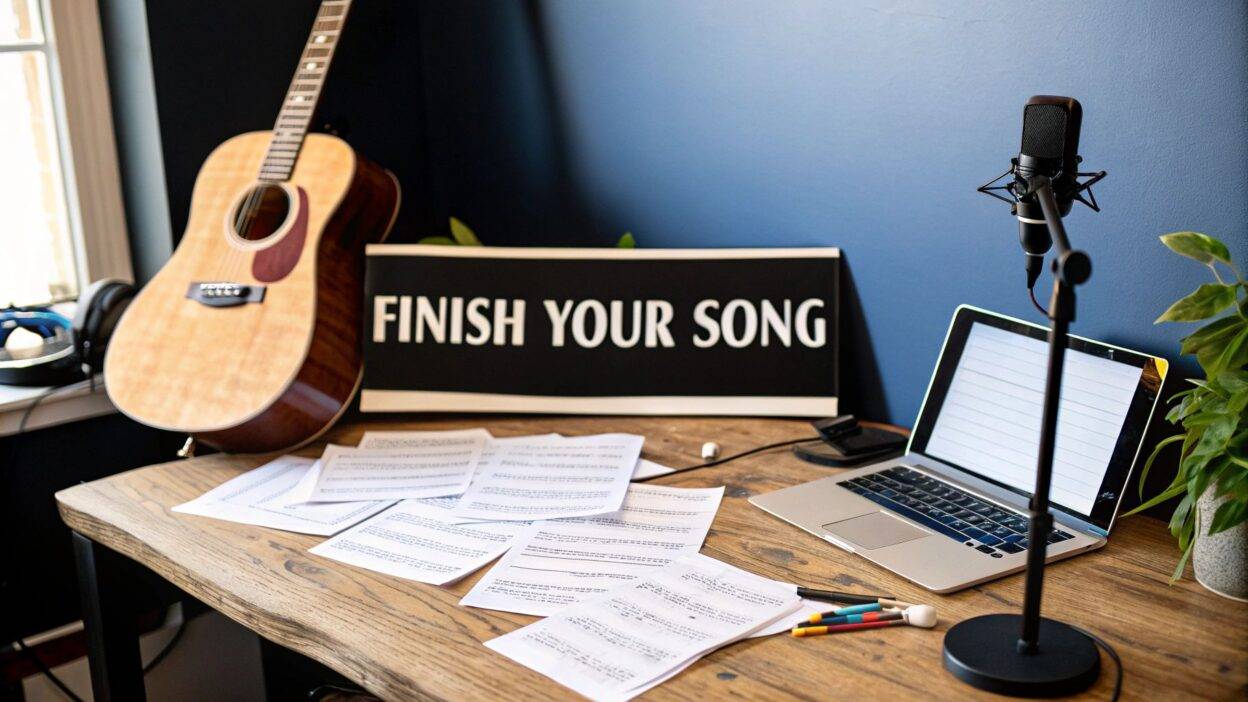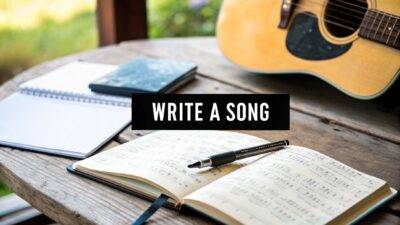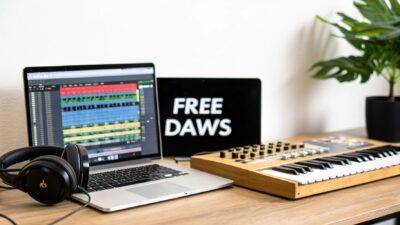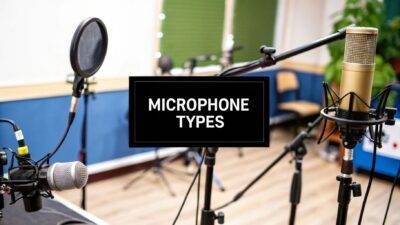That blank page staring back at you? Every songwriter knows that feeling. It's not a sign you've lost your magic; it’s just songwriting block, a totally normal part of the creative cycle where the well of inspiration feels temporarily dry. Figuring out why it’s happening is your first step to getting the music flowing again.
Why Songwriting Block Happens to Everyone
If you’re feeling stuck, trust me, you're in very good company. Even the legends hit a wall where the words and melodies just won't cooperate. This isn't failure—it's a signal. Your creative mind might be telling you it's time for a different angle, a much-needed break, or a completely new kind of input. More often than not, a creative block is just a symptom of something deeper.
These hurdles are practically a rite of passage for musicians. In fact, a survey from the European Composer & Songwriter Alliance revealed that over 60% of professional songwriters deal with creative blocks on a regular basis. Many point to the relentless pressure for new content in the streaming age as a major culprit. Diving into these industry pressures and songwriting challenges can help put your own experience into a broader context.
Identifying the Root Cause
Pinpointing the "why" behind your block is everything. Are you just plain exhausted from a crazy schedule? Or maybe you're frozen by the fear that your next song won't measure up to your last one? Getting to the source lets you apply the right fix instead of just banging your head against the wall.
So, let's play detective. Here are a few usual suspects I see all the time:
- Perfectionism: This is a big one. The pressure to write a hit from the very first note can be so intense that it stops you from writing anything at all. You end up judging every idea before it even has a chance to breathe.
- Creative Burnout: Your creative tank is empty. After pouring all your energy into a project or a tour, there's simply nothing left for new ideas. It's your brain's way of demanding a recharge.
- Lack of a Clear Process: Sometimes, the problem isn't a shortage of ideas but the absence of a road map. You might have a killer guitar riff or a great lyrical hook, but you have no clue how to turn that spark into a finished song.
This decision tree can be a great starting point for figuring out if your block is about a lack of ideas or a problem with structuring them.
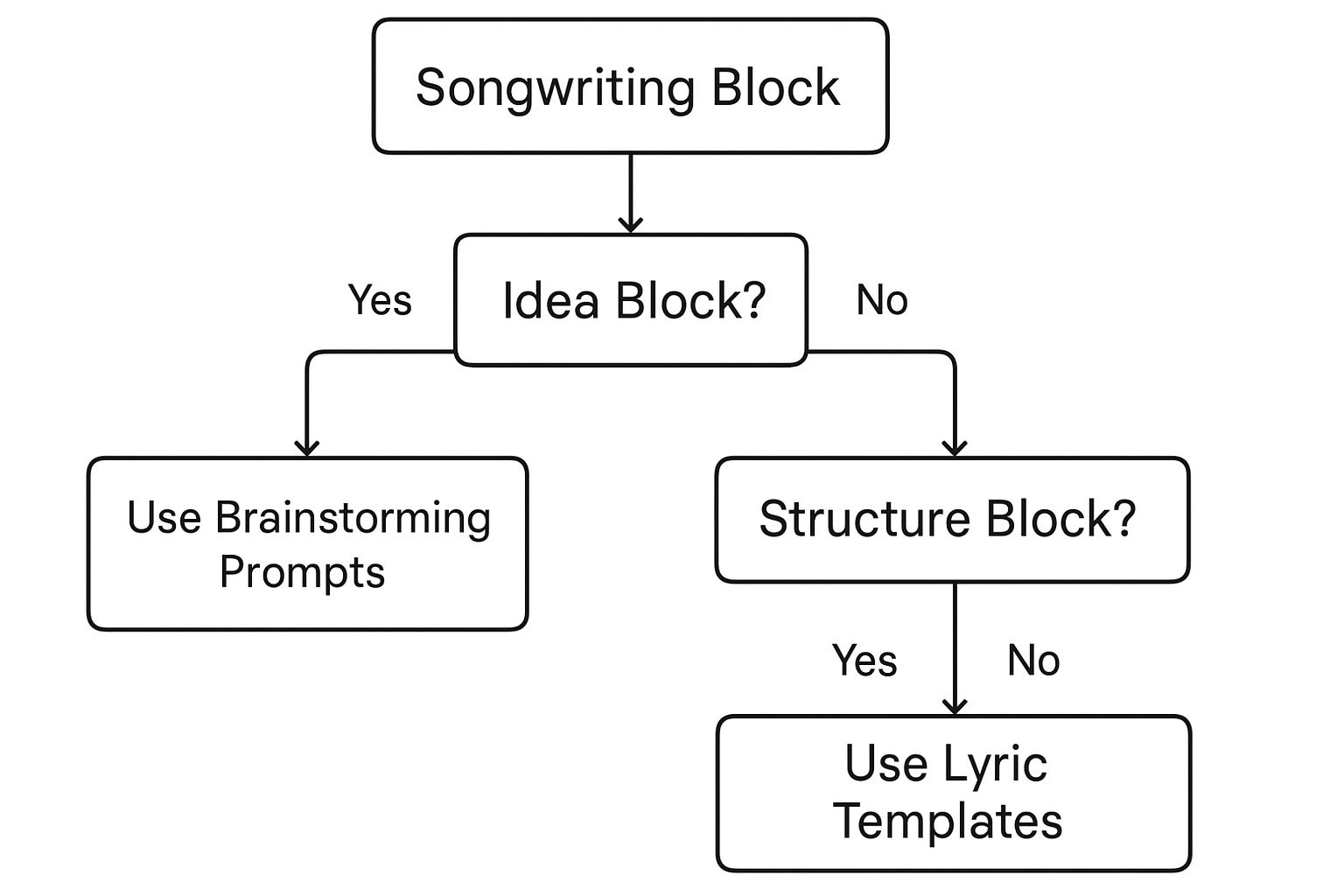
This quick visual guide can help you decide whether to focus on brainstorming new concepts or to pull out some templates to organize the bits and pieces you already have.
To help you dig a little deeper, I've put together this table. It connects common feelings or "symptoms" to their likely cause and gives you a concrete first step to take.
Pinpointing the Cause of Your Songwriting Block
Use this table to quickly identify the primary source of your creative standstill.
| Symptom | Potential Cause | First Step to Take |
|---|---|---|
| "I have lots of half-finished ideas but can't complete a song." | Lack of Structure. You need a process to develop your initial sparks. | Pick one idea and commit to finishing it using a simple song structure (e.g., verse-chorus-verse-chorus-bridge-chorus). |
| "I keep deleting everything I write because it’s not good enough." | Perfectionism. The fear of imperfection is paralyzing your output. | Start a "bad song" journal. Give yourself permission to write terribly for 15 minutes a day without any editing. |
| "I feel uninspired and have no new ideas." | Creative Burnout. Your creative well is dry from overwork or stress. | Schedule a non-music-related creative activity. Visit an art gallery, go for a hike, or watch a movie you've been putting off. |
| "I'm comparing my new work to my past successes." | Self-Doubt. You're trapped by the weight of your own expectations. | Revisit an old song you love (that you wrote) and analyze what makes it work. Remind yourself that you've done it before. |
By using this table to diagnose your specific issue, you can start taking targeted action.
The most freeing realization is that songwriting block isn't a monster to be slain but a puzzle to be solved. Each piece you identify—be it burnout, fear, or a technical hurdle—brings you closer to the solution. Viewing it this way transforms frustration into a constructive challenge.
Once you’ve identified the specific nature of your block, you can shift from feeling paralyzed to proactively solving the problem. It’s not about trying to force inspiration out of thin air; it’s about clearing the path so it can find its way back to you naturally.
Learn to Silence Your Inner Critic
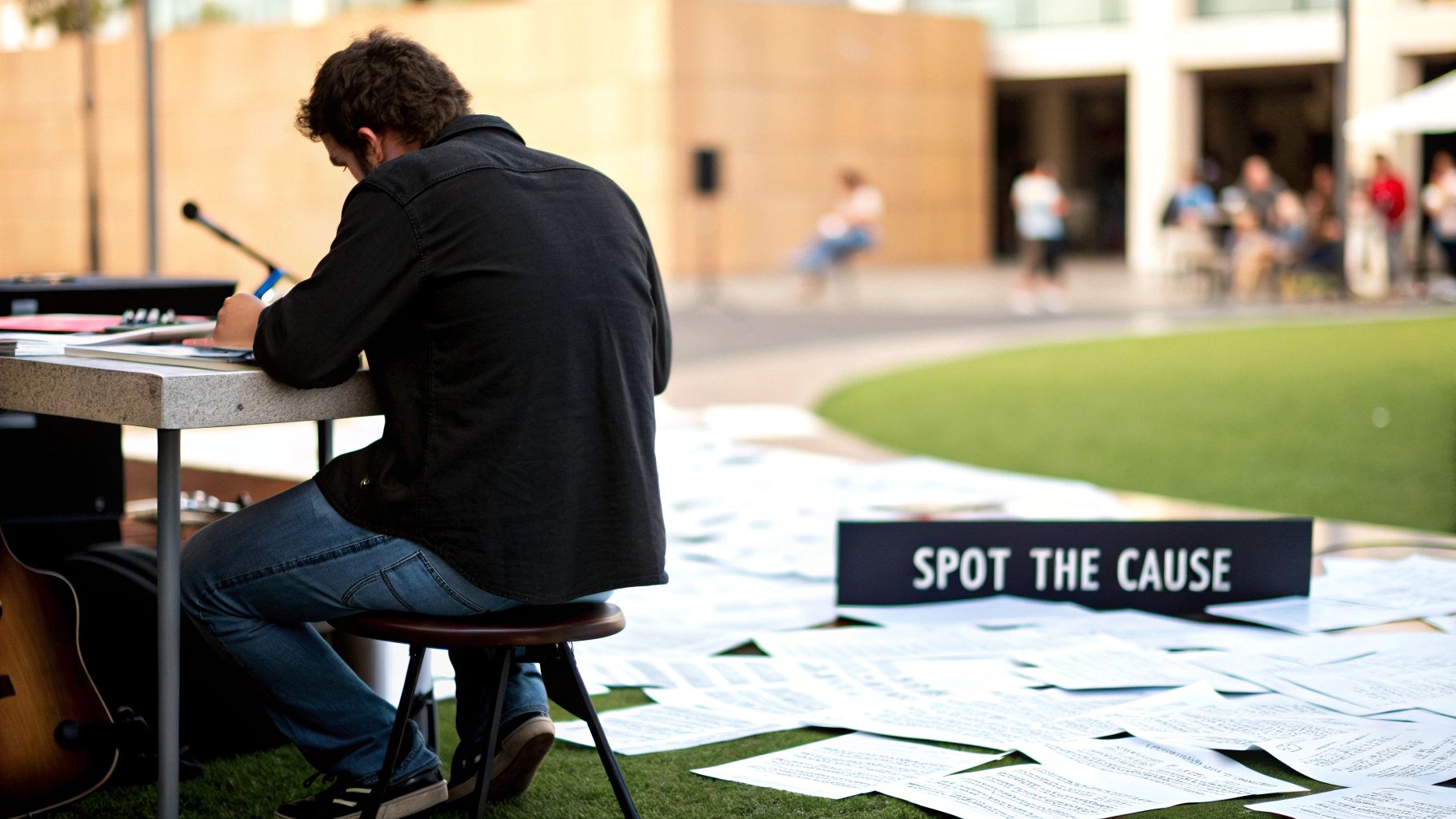
Let's be honest. Most of the time, the biggest thing standing in your way isn't a lack of ideas—it's that voice in your head. The inner critic. It's the part of you that insists every single line has to be a stroke of genius right out of the gate. This is the perfectionism trap, and it's a huge reason for songwriting block. It can freeze you solid before you even write a single word.
The trick is to change the game. Instead of setting out to write a masterpiece, just aim to finish a song. That’s it. Any song will do. This one little mental adjustment can completely deflate the pressure you put on yourself. Suddenly, the impossible mountain becomes a manageable hill. You're no longer judging the outcome; you're just focused on the simple act of creating.
Schedule Failure to Find Success
Here’s a powerful exercise I use when I’m really stuck: I schedule a "failure session." It sounds backward, I know, but it works wonders. Give yourself 30 minutes with one simple goal: write the absolute worst song you can possibly imagine.
Seriously. Lean into every cliché you can think of. Write cringey, awkward rhymes. Use the most boring, predictable chord progressions. When "bad" is the goal, the fear of not being "good enough" completely disappears. You’re just playing. It short-circuits that perfectionist wiring and gets you writing again without any judgment. The funny thing is, you’ll almost always stumble upon a cool line or an interesting melody snippet, even in a pile of intentional garbage.
The goal isn't to be perfect; the goal is to be done. Shifting your definition of success from 'writing a hit' to simply 'completing a draft' is one of the most effective ways to overcome the paralysis of perfectionism and beat your songwriting block.
This little trick helps rewire your brain to see progress, not perfection, as the real win. It's a reminder that songwriting is a messy process of discovery, not a high-stakes test of your genius.
Give Yourself Permission to Write Badly
Think of your first drafts as lumps of clay. They’re not supposed to be finished sculptures yet. Nobody gets it perfect on the first try—not even your heroes. I can guarantee their hard drives are filled with half-baked demos, clunky lyrics, and ideas that went nowhere. That's just part of the process.
You have to give yourself that same freedom to be imperfect. Here are a few ways to put that into practice:
- Shrink your focus. Forget the whole song for a minute. Just try to find one interesting line. Or two chords that sound cool together. That's a win.
- Use "dummy" lyrics. Stuck on a line? Don't stop. Mumble some nonsense, sing "la la la," or just write "I need a better line here" and keep moving. The point is to maintain momentum. You can always go back and polish it later. For more on this, our complete guide on how to write song lyrics has a ton of practical techniques.
- Capture everything, judge nothing. Keep a voice recorder app or a notebook handy at all times. Record every little melody, riff, or phrase that pops into your head, no matter how silly or small. This becomes your personal "idea bank" to dip into when you're feeling dry.
When you start working this way, that loud inner critic starts to sound more like a distant whisper. You learn that showing up and doing the work, consistently, is what gets songs finished—not waiting for some bolt of lightning inspiration. It's a much healthier and more productive way to approach your craft.
Shake Things Up with Creative Prompts

When your go-to methods for writing music have run dry, the best thing you can do is intentionally break your own rules. That feeling of being stuck in a songwriting block usually means you're just treading the same creative ground over and over. The fix is to throw a wrench in the works and force your brain down a new path.
This isn’t about sitting around waiting for lightning to strike. It's about creating your own spark through deliberate play. By using some unconventional prompts, you can sidestep your creative ruts and discover ideas that were hiding just out of sight. Think of it as hitting the reset button on your creative process.
Describe an Everyday Object
One of the most effective exercises I’ve found for generating fresh lyrical ideas is called "object writing." It sounds almost too simple, but the results can be surprisingly deep. Just pick a totally random, even boring, object in front of you—a coffee mug, a paperclip, a dusty speaker—and write about it, nonstop, for ten minutes.
The key is to engage all your senses. What does it look like? What’s its texture? What sound does it make, or what sound could it make? Does it have a smell? A taste (even an imaginary one)? Don’t try to write perfect lyrics. Just fill the page with concrete, sensory details. This exercise is like weight training for your descriptive muscles, giving you a rich bank of imagery to use in your next song.
Try on a New Persona with Method Songwriting
Actors use method acting to become a character, and we can do the same as songwriters. If writing about your own life feels stale, invent a fictional character and tell their story instead.
Give them a name, a bit of a backstory, and a core conflict. What are they most afraid of? What do they desperately want? Writing from this new perspective frees you from the echo chamber of your own experiences and opens up a whole new world of storytelling. You could end up with a song from the point of view of a homesick astronaut, a runaway bride, or a librarian with a wild secret.
The fastest way out of a creative rut is intentional disruption. When you force yourself to write from a new perspective or about an unusual subject, you’re bypassing the tired neural pathways that keep you stuck. This is where fresh lyrical and melodic ideas are born.
Make a Lyrical Collage
This is a fun, hands-on way to jolt yourself out of using the same old phrases. All you need is an old magazine, a newspaper, or even some junk mail, plus a pair of scissors.
- Start cutting out words and phrases that jump out at you. Don't question why—maybe you like the sound, the meaning, or just how it looks. Just collect the raw material.
- Toss them all together in a pile or a bowl.
- Pull them out at random and arrange them into new, often strange, combinations.
You’re not trying to write a finished verse here. The magic is in seeing how unrelated ideas, when smashed together, can create powerful and unexpected images. You might pull out "velvet shadow" next to "highway static," and suddenly, a mood or a story starts to take shape.
Once these exercises give you a few new lyrical or melodic sparks, you can start thinking about the bigger picture. If you're wondering how to weave these fragments together, learning a bit about how to arrange a song can provide a solid framework for turning those sparks into a finished piece of music.
Dealing With the Pressures of the Modern Music Game
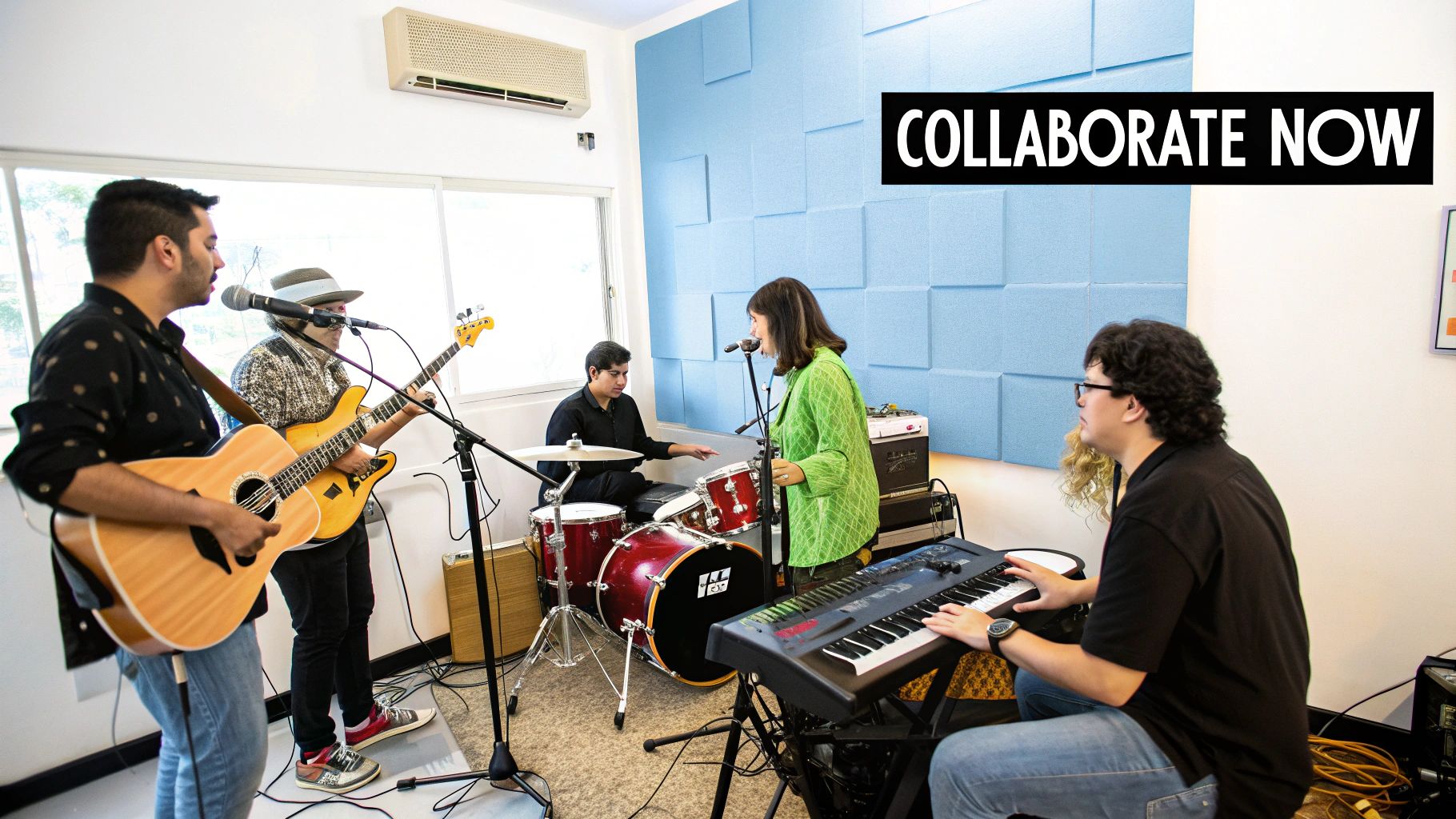
Let's be real. The pressure to "create content" instead of just "writing songs" is a monster that every songwriter is wrestling with right now. The music world today isn't just fast—it's relentless. It's all driven by streaming algorithms and social media feeds that demand a constant stream of new stuff. It’s no wonder so many of us hit a wall.
When you feel like you're stuck on a content treadmill, desperately trying to cook up a new track for a Spotify playlist or a sound that might go viral on TikTok, the fun of making music can vanish. It gets replaced by a knot of anxiety in your stomach. The demand for sheer quantity can feel like it's squeezing the life right out of your art.
This isn't just in your head. The global recorded music market is booming, growing to US$29.6 billion, but that growth comes with a catch: intense pressure on creators to produce more, faster. Streaming platforms are designed to reward artists who release music constantly, which can absolutely trigger or worsen a creative block. You can dig into the numbers and what they mean by checking out these market trend reports for creators.
How to Adapt Without Selling Out
So, how do you navigate this high-pressure world without completely burning out? The trick is to adjust your approach without sacrificing your artistic soul. You don't have to drop a new single every Friday to stay on people's radar.
Instead, try working smarter, not harder:
- Make more out of less. Got a song you love? Great. Release the official version, then follow it up with a stripped-down acoustic take. Film a short behind-the-scenes video talking about the lyrics. Shoot a quick tutorial on how you dialed in that specific guitar tone. This keeps your audience engaged without you having to write and produce an entirely new song.
- Batch your creativity. Set aside dedicated time—maybe a weekend, maybe a full week—just for writing. No editing, no producing, just getting ideas down. Do the same for recording demos. This lets you build up a bank of raw material that you can polish and release over time, giving you a much healthier and more sustainable schedule.
Remember this: your creative health comes first. Just admitting that industry pressure is a real cause of writer's block is a huge first step. The goal isn’t to pretend the pressure doesn't exist, but to build a creative process that can withstand it.
This way, you're still feeding the content machine, but you're doing it on your own terms.
Using AI as an Assistant, Not a Replacement
Another modern beast we have to contend with is the rise of AI in music. It's easy to look at these tools and feel threatened, but I've found they can be incredible allies for breaking through a block if you use them the right way. Don't think of AI as a co-writer trying to steal your voice; think of it as an assistant who never gets tired and never runs out of coffee.
For example, if you're completely stuck on a chord progression, a tool like this can spit out fifty different ideas in ten seconds. Ninety-five percent of them will probably be garbage. But one or two might have that little spark you needed to get moving again. The same goes for finding a starting point for lyrics or a simple melody.
The ethical conversations are ongoing, and they're important. But for now, the practical use is clear: use these tools to get over a specific hump, not to do the heavy lifting for you. Let the machine do the grunt work of generating random ideas so you can focus on the part only a human can do—breathing real emotion, story, and perspective into the music.
Build a Sustainable Songwriting Workflow
Inspiration is wonderful, but it’s a terrible business partner. The most reliable way to beat songwriting block for good isn't about waiting for that lightning bolt of a great idea; it's about building a system that doesn't need one to function. Consistency, more than anything else, is your best defense against a creative dry spell. It transforms songwriting from some magical, unpredictable event into a dependable practice you can count on.
This really just boils down to creating a habit. It doesn't have to be some monumental commitment, either. The goal is simply to establish a ritual that tells your brain, "Okay, it's time to create." This could be as simple as a 15-minute lyric freewriting session with your morning coffee, or maybe it's a dedicated two-hour block every Saturday where you just mess around with chord progressions.
The important part is making it a non-negotiable part of your schedule, just like brushing your teeth or going to the gym. At first, it might feel forced, like you're just going through the motions. But stick with it. Over time, you're actually training your creative muscles to show up on command, not just when they happen to feel like it.
Your Idea Bank Never Starts Empty
One of the biggest sources of paralysis for any writer is the dreaded blank page. The solution? Never start with one. You need to build yourself an idea bank—a single, go-to place where you can dump every little creative fragment that pops into your head. This system guarantees you’ll always have some raw material to play with.
Your idea bank can live almost anywhere, so pick what feels easiest for you:
- A dedicated folder in your phone's voice memo app is perfect for humming melodies or recording a cool riff you just stumbled upon.
- A note-taking app like Evernote or Notion is great for jotting down lyrical snippets, cool phrases you overhear, or interesting song titles.
- A classic physical notebook still works wonders for scribbling down chord charts and story concepts.
The specific tool isn't what matters. The habit is everything. Every single time you have a spark of an idea—no matter how small or silly it seems—capture it immediately. Then, when you sit down for a real writing session, you're not facing an empty void. You're opening a treasure chest of starting points ready to be explored.
Break It Down Like a Project Manager
The thought of "writing a song" can feel incredibly intimidating. It's a huge, vague task that can easily lead to overwhelm. So, let’s borrow a page from the project management playbook and break that monster task down into smaller, more manageable micro-tasks. This approach demystifies the whole process and makes it feel far less daunting.
Don't put "Write Song" on your to-do list. That's a classic recipe for procrastination. Instead, list the actual, tangible steps. This shifts your focus from the massive, scary outcome to the small, achievable actions you can take right now.
For example, your "song project" could be broken down like this:
- Find a compelling four-chord loop.
- Record the loop as a quick voice memo.
- Brainstorm five potential song titles that fit the vibe.
- Write a rough draft of the first verse lyrics.
- Hum a simple chorus melody over the loop.
Each of these tasks is concrete and can often be knocked out in just a few minutes. Checking off these small wins builds momentum and makes the entire songwriting process feel more like assembling a puzzle than trying to conquer a mountain. It’s a simple system that gives your creativity the structure it needs to thrive, ensuring you’re always moving forward.
Answering Your Nagging Questions About Songwriting Block
Even when you’re actively working on your craft, that familiar sense of dread can creep in. Songwriting block is a tricky, persistent beast, and it’s natural to have questions when you find yourself stuck. Getting straight answers to these common worries can be the difference between staying frozen and pushing through with confidence.
Let’s get into some of the biggest concerns I hear from songwriters.
How Long Does Songwriting Block Last?
This is the million-dollar question, isn't it? The frustrating but honest answer is that it's different for everyone. A block could be over by lunchtime, or it could hang around for months, even a year. The duration is almost always tied to the root cause. A simple case of a tired mind might vanish after a walk and a good night's sleep. But a deeper creative burnout? That often demands a real break and a significant change of scenery.
The trick is to stop staring at the calendar. Fixating on a timeline only adds to the pressure. Instead, reframe the problem. Don't ask, "When will this be over?" Ask yourself, "What’s one small, creative thing I can do right now?" This simple shift moves you from a place of helplessness to one of control.
What If I’m Just Not Creative Anymore?
Every songwriter I know has had this fear whisper in their ear at some point. But here's the truth: creativity isn't a tank of gas you can run dry. It’s a muscle. Let it sit unused, and it will feel weak and unresponsive. Start exercising it again, and it will regain its strength. I promise.
That feeling of being "all out" of ideas is usually a symptom of something else going on. It could be:
- Creative Rut: You're leaning on the same chords, the same themes, the same old patterns.
- Brain Fog: Your mind is just plain tired from work, stress, or life in general. It doesn't have the energy for creative leaps.
- Empty Well: You haven't been feeding your creative spirit with new music, books, films, or just interesting life experiences.
Remember the songs you've already written. You did it before, and that ability hasn't disappeared. This feeling is often just a sign to stop forcing it. Go live a little—the well will refill on its own.
The fear of losing your creativity is often the very thing that blocks it. Trust that your creative well is deep; sometimes you just need to stop trying to draw from it so frantically and give it time to refill.
Is It Okay to Use AI Songwriting Tools?
The rise of AI has thrown a real curveball into the creative world. I get it. Many writers feel like using AI is cheating, while others are embracing it as a new kind of collaborator. My take? It all comes down to how you use it.
Asking an AI to write a complete song for you will likely leave you feeling empty and disconnected from the work. But using it to shatter a specific moment of songwriting block? That can be a game-changer.
Think of it less as a ghostwriter and more as an tireless brainstorming partner. Stuck on a chord progression? An AI can spit out dozens of options in seconds. Sure, most of them will be generic junk, but one or two might just contain the spark you need to get going again on your own terms.
The controversy around AI-generated tracks like "Heart on My Sleeve" raised serious, valid questions about originality and ownership, which only adds to our anxiety. The best way to navigate this is to see these tools as a way to get unstuck, not as a replacement for your own soul and your own story. You can learn more about the complexities from this piece on the new value gap for songwriters.
For those just starting out, overcoming that blank page is often the single biggest hurdle. If you're looking for more of the fundamentals, you might find these songwriting tips for beginners really helpful.
Here at ChordX, we believe the right tools and knowledge can completely change your creative life. Our platform is full of expert-led tutorials and resources built to help you write, produce, and polish your music with skill and confidence. Let us help you turn your ideas into finished songs—explore everything we have to offer at ChordX.io.
